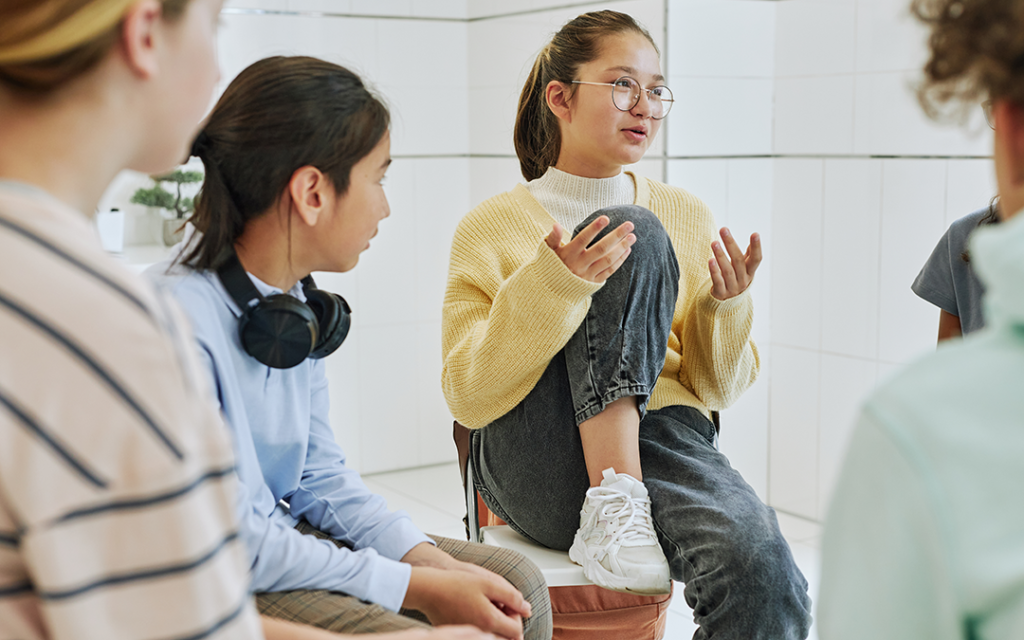Teaching EQ to Our Youth: Why Emotional Intelligence Matters Now More Than Ever

“When you’re drowning in loneliness and your emotions get the best of you, everyone seems so far away…I needed a life raft. The reason I couldn’t handle these emotions was because I did not have high emotional intelligence.”
These are the words of Maximilian Park, in a TED talk he delivered in 2018 when he was a senior in high school. Emotional intelligence, the ability to recognize and respond appropriately to the emotions being experienced in oneself and others, is quickly waning among our youth.
Startling Statistics:
In what he described as a “silent crisis,” Max shared some troubling data about the state of mental health among young people in the U.S., including:
- The American College Health Association reported that overwhelming anxiety among undergraduate students jumped from 50% in 2011 to 62% in 2016.
- In the last 10 years, the number of hospital admissions for suicide attempts by teenagers has doubled.
The Digital Dilemma: Social Media, Family Disconnect, and Mental Health
What has happened to push so many students into this state? Oversaturation of social media influences, chronic retreating into a digital world devoid of in-person relationships, and disconnected family dynamics have played a major role. Since Max’s TED talk in 2018, the youngest generation experienced two unprecedented years of lockdown-imposed restrictions on their educational and social experience, leaving students feeling more isolated, depressed, and anxious than ever. One 2022 study from the National Center for Educational Statistics showed that 80% of US public schools reported the pandemic has negatively impacted student behavior and socio-emotional behavior.
According to that study:
- 56% of the respondents cited increased incidents of student misconduct-induced classroom disruptions
- 48% reported acts of disrespect toward teachers and staff
- 42% cited prohibited electronic device use as a lingering impact of the COVID-19 lockdown.
A Call For Action:
National Center for Educational Statistics Commissioner, Peggy G. Carr stated, “Students thrive in an environment with effective social, emotional, and behavioral support. So when we see 72% of our public schools report an increase in chronic absenteeism among our students, it poses an opportunity for education leaders to act quickly.”
It will take time to heal the long-term effects of the lockdown on this generation, but the reality is that students were already hurting before that event. According to Max, “Teenagers like me got this way because they were too afraid to open up, or just didn’t know how.” He described anxiety as feeling like a snowball rolling down a hill, gaining speed, momentum, and size with each passing minute until it becomes unmanageable. To combat this, having emotional intelligence training in every school can help to teach students how to recognize their emotions as they emerge and learn constructive ways to share and address them.
Ronen Habib, the creator/teacher of the Positive Psychology course at Gunn High School and founder of EQschools, an organization providing emotional intelligence training to students, parents, and teachers, would agree with Max’s recommendation. In Ronen’s TED talk called “Emotional Intelligence – The Skills Our Students Deserve,” he describes emotional intelligence as a compass that helps students recognize where they are so they can effectively determine where they need to go. In a time when students are feeling more lost than ever before, that compass can become invaluable.
Advocates for the inclusion of EQ education in schools is not limited to the U.S. Ecole Mondiale World School, an international baccalaureate academy serving families all over the world, reported that they have observed teaching emotional intelligence benefits students in many ways, including increased self-awareness, empathy, self-regulation, better stress management, better satisfaction levels, and increased ability to open up and talk about their feelings.
Additionally, the benefit of teaching emotional intelligence in school is that students are then equipped to carry these beneficial tools with them as they mature into adulthood. These children will eventually move into the workplace where managers and teams are already struggling to catch up with this crucial life skill. According to an article by Mark Nevins in Forbes, “We are not going back to the way business used to be conducted, and certainly not anytime soon. Emotional Intelligence will continue to be a critical element of great leadership, and arguably the most important one in the coming year as we all try to identify ‘the new normal.’”
For these reasons, it’s important that we advocate and work to integrate emotional intelligence into every school’s learning environment so that all students have the tools they need to face their struggles and challenges with self-awareness, compassion, and clarity.
About TLC
The Lincoln Center for Family and Youth (TLC) is a social enterprise company serving the Greater Philadelphia Area. Among its five divisions, TLC offers School-based Staffing Solutions, Mobile Coaching and Counseling, and Heather’s Hope: A Center for Victims of Crime. These major programs are united under TLC’s mission to promote positive choices and cultivate meaningful connections through education, counseling, coaching, and consulting.
About the Author
MaryJo Burchard (Ph.D. in Organizational Leadership) is co-founder and principal of Concord Solutions, a Virginia-based consultancy firm focused on helping leaders and organizations thrive while facing major disruption. Concord Solutions offers consulting, coaching, training, research, and keynote speaking surrounding trauma-informed leadership and assessing and building change readiness, trust, and belonging.